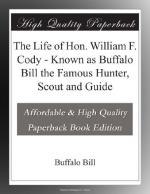While we were looking at the Mormons they were holding a funeral service over the remains of some of their number who had died. Their old cemetery is yet indicated by various land-marks, which, however, with the few remaining head-boards, are fast disappearing.
We passed on through this “Valley of Death,” as it might then have been very appropriately called, and after riding for some time, my father pointed out a large hill and showed me his camp, which afterwards became our home.
There was another trading-post near by, which was conducted by Mr. M.P. Rively, who had a store built, partly frame, and partly of logs. We stopped at this establishment for a while, and found perhaps a hundred men, women and children gathered there, engaged in trading and gossipping. The men had huge pistols and knives in their belts; their pantaloons were tucked in their boots; and they wore large broad-rimmed hats.
To me they appeared like a lot of cut-throat pirates who had come ashore for a lark. It was the first time I had ever seen men carrying pistols and knives, and they looked like a very dangerous crowd. Some were buying articles of merchandise; others were talking about the cholera, the various camps, and matters of interest; while others were drinking whisky freely and becoming intoxicated. It was a busy and an exciting scene, and Rively appeared to be doing a rushing trade.
At some little distance from the store I noticed a small party of dark-skinned and rather fantastically dressed people, whom I ascertained were Indians, and as I had never before seen a real live Indian, I was much interested in them. I went over and endeavored to talk to them, but our conversation was very limited.
That evening we reached our camp, which was located two miles west of Rively’s. The first thing I did was to hunt up my ponies, and from my father’s description of them, I had no difficulty in finding them. They were lariated in the grass and I immediately ran up to them supposing them to be gentle animals. I was greatly mistaken, however, as they snorted and jumped away from me, and would not allow me to come near them.
My father, who was standing not far distant, informed me that the ponies were not yet broken. I was somewhat disappointed at this; and thereupon he and one of his men caught one of the animals and bridled her, then putting me on her back, led her around, greatly to my delight. I kept petting her so much that she soon allowed me to approach her. She was a beautiful bay, and I named her “Dolly;” the other pony was a sorrel, and I called him “Prince.”
In the evening some Indians visited the camp—which as yet consisted only of tents, though some logs had been cut preparatory to building houses—and exchanged their furs for clothing, sugar and tobacco. Father had not learned their language, and therefore communicated with them by means of signs. We had our supper by the camp-fire, and that night was the first time I ever camped out and slept upon the ground.




